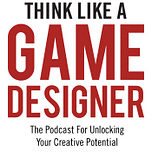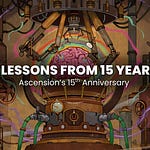About Alex Yeager
Alex Yeager joins us on today’s episode to bring his wealth of knowledge and experience from over 20 years in the board game industry. Alex is the Chief Operating Officer at Amigo Games, overseeing the company’s North American operations. Before his time at Amigo, Alex held various leadership roles at renowned companies like Mayfair Games, where he served as Vice President of Acquisition and Development, and Steve Jackson Games, where he contributed significantly to their demo programs. He also has a rich background as an event coordinator and demo leader, helping bring many games to wider audiences.
In this episode, Alex shares his journey, from falling in love with tabletop games like Cosmic Encounter and Illuminati to his deep involvement in demoing for Steve Jackson Games and CheapAss Games. He walks us through his innovative 2-2-2 demo method, explains what makes a game pitch successful, and dives into the marketing strategies that can revive evergreen titles like Bonanza. Alex’s insights into game development, pitching, and the mechanics behind building successful games provide a goldmine of advice for designers and developers alike. Enjoy!
Want to support the podcast and get more design lessons?
Paying subscribers enjoy an abundance of extra game design content and an exclusive newsletter with new lessons, archive access, videos, and more! By opting for a free or paid subscription, you can get the latest articles delivered to your inbox and support this podcast!
Ah-ha! Justin’s Takeaways
Creating a Game Family Tree Insert: Alex shared how Catan succeeded by providing players with a "family tree" insert, guiding them through the various expansions. This gave players a roadmap for exploring new content that suited their tastes. As Ascension prepares to re-release its back catalog of 16 expansions as part of our recent crowdfund, this is an incredibly actionable idea we’ll be applying in next year’s Ascension releases.
The 2-2-2 Demo: Alex’s 2-2-2 demo framework is a fantastic tool for game designers. Whether you need a two-sentence pitch, a two-minute overview, or a two-player demo, tailoring the level of detail to your audience is key. This approach prevents overwhelming your audience with too much information at once while still providing a clear and concise introduction to your game.
Enthusiasm is a Superpower: One of Alex’s core lessons is the power of genuine enthusiasm. Sharing your passion for your product and the broader world of gaming draws people in and sustains long-term engagement. Having spent over two decades in the industry, Alex and I know that curiosity and maintaining a beginner’s mindset are essential to staying inspired and relevant.
Show Notes
"Steve Jackson was one of the frontrunners in using digital contacts, using emails and forums to bring people together and talk about their stuff." (00:03:35)
Alex shares his origin story, telling us how his passion for games like Cosmic Encounter and Illuminati sparked his journey into the gaming industry. The lesson here is that early exposure to games can ignite a lifelong passion, setting the foundation for a career in game design and development.
Alex goes on to describe how Steve Jackson Games pioneered online engagement through emails and forums, which created early communities around games. As we’ve seen in previous episodes, leveraging digital tools to build communities has been vital in gaming for decades, long before the rise of social media.
"We did the 2-2-2 demo, which is: a two-sentence demo, a two-minute demo, and then if there's interest, you go into two full plays." (00:16:21)
Alex introduces his incredible 2-2-2 demo framework, a tool for effectively presenting games to different audiences. This is another concept we hear about repeatedly—game designers should always be prepared to pitch their games in stages based on the audience's interest level. If you’re a game designer, you need to be able to describe your game in only a few sentences. You can read more about my thoughts on the 2-2-2 framework in the Ah-Ha Moments above.
"Is the game good? That's just a checkmark. Most games are good nowadays; what matters is how it fits in a company's portfolio." (00:07:09)
Alex explains that having a good game isn’t enough for publishers. Game designers need to understand what each publisher is looking for and when they plan to release games, so they can make sure their game fits into the publisher’s plans.
For the same reason, he describes how a publisher’s rejection doesn't necessarily reflect on the game's quality. The lesson here is that game designers should remain persistent and not take rejection personally—it's more about timing and fit than the game itself.
"One of the things we’ve learned at Amigo is that the simpler the rules, the more likely a game will become an evergreen." (00:21:56)
Alex reiterates another great game design principle—simplicity in rule design often leads to long-term success, or "evergreen" status, for a game. The takeaway is that designers should strive for simplicity in their core mechanics to increase the game's longevity and marketability.
"Sometimes you're not trying to sell a game, you're trying to sell a social experience." (00:23:01)
Here, Alex explains how, at the core, games are about creating social experiences rather than just selling rules and mechanics. The lesson for designers is to focus on how their games foster interactions among players and create memorable moments. This is the core principle of game design—player experience is the most important metric. While a game can be complex and nuanced, if it’s not fun, it won’t attract many players.
"We had this gap where Bonanza was out of print for years, and when we brought it back, we had to rebuild awareness from scratch." (00:32:28)
Alex describes the challenge of reviving the classic game Bonanza after it had been out of circulation. The key lesson is that sustaining awareness for a game is crucial, and if it fades, it requires significant effort to rebuild that visibility in the market.
"Enthusiasm is a superpower. Passion and genuine excitement about your game and the hobby draw people in." (00:43:28)
Alex discusses the importance of passion and enthusiasm in sustaining a long career in the gaming industry. The lesson is that game designers should lead with their love for games, sharing that enthusiasim with the community to foster lasting success.













